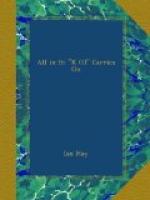But in five minutes their mouths were agape with scandalised astonishment; in ten, the heavens were rent with their protesting cries. Accustomed to see football played with the feet, and to demand with one voice the instant execution of any player (on the other side) who laid so much as a finger upon the ball or the man who was playing it, the exhibition of savage and promiscuous brutality to which their superior officers now treated them shocked the assembled spectators to the roots of their sensitive souls. Howls of virtuous indignation burst forth upon all sides.
When the three-quarter-backs brought off a brilliant passing run, there were stern cries of “Haands, there, referee!” When Bobby Little stopped an ugly rush by hurling himself on the ball, the supporters of the other Brigade greeted his heroic devotion with yells of execration. When Angus M’Lachlan saved a certain try by tackling a speedy wing three-quarter low and bringing him down with a crash, a hundred voices demanded his removal from the field. And, when Mr. Waddell, playing a stuffy but useful game at half, gained fifty yards for his side by a series of judicious little kicks into touch, the spectators groaned aloud, and remarked caustically—
“This maun be a Cup-Tie, boys! They are playin’ for a draw, for tae get a second gate!”
Altogether a thoroughly enjoyable afternoon, both for players and spectators. And so home to tea, domesticity, and social intercourse. In this connection it may be noted that our relations with the inhabitants are of the friendliest. On the stroke of six—oh yes, we have our licensing restrictions out here too!—half a dozen kilted warriors stroll into the farm-kitchen, and mumble affably to Madame—
“Bone sworr! Beer?”
France boasts one enormous advantage over Scotland. At home, you have at least to walk to the corner of the street to obtain a drink: “oot here” you can purchase beer in practically every house in a village. The French licensing laws are a thing of mystery, but the system appears roughly to be this. Either you possess a license, or you do not. If you do you may sell beer, and nothing else. If you do not, you may—or at any rate do—sell anything you like, including beer.
However, we have left our friends thirsty.
Their wants are supplied with cheerful alacrity, and, having been accommodated with seats round the stove, they converse with the family. Heaven only knows what they talk about, but talk they do—in the throaty unintelligible Doric of the Clydeside, with an occasional Gallicism, like, “Allyman no bon!” or “Compree?” thrown in as a sop to foreign idiosyncracies. Madame and family respond, chattering French (or Flemish) at enormous speed. The amazing part of it all is that neither side appears to experience the slightest difficulty in understanding the other. One day Mr. Waddell, in the course of a friendly chat with his hostess of the moment—she was unable to speak a word of English—received her warm congratulations upon his contemplated union with a certain fair one of St. Andrew (to whom reference has previously been made in these pages). Mr. Waddell, a very fair linguist, replied in suitable but embarrassed terms, and asked for the source of the good lady’s information.




